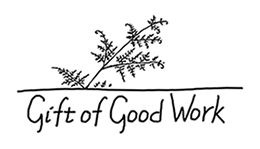In economic theory, there are two terms that are used in describing a person’s relationship to a transaction: cost and utility. We, as rational economic actors, are supposed to objectively weigh the cost of what we put into the transaction against the utility of what we get from the transaction, and choose which transactions to participate in accordingly. In the context of employment, our labor is the cost, and the pay we receive, and the things we buy with that pay, provide us with utility.
Economics is a funny animal, a social science that likes to masquerade as a hard science, puffing itself up with complex formulas. When it comes down to it, it amounts to an attempt to model human behavior, in the context of this made up system we have designed and then attempt to define as those it’s laws where laws of nature. This notion of work-as-cost is one of the places where I have seen the model fall short.
Nowhere in this equation is there room for the satisfaction of a job well done, or the powerful human motivation of contributing to another’s well being. These are powerful motivating forces that I have witnessed throughout my life, and perhaps nowhere so plainly as when leading volunteer construction crews with Habitat for Humanity. There I saw people choosing to spend their time performing a range of tasks from menial labor to skilled carpentry for no monetary compensation. In many cases volunteers were often monetary donors to the organization, which means that not only were they not being paid for their work, they were in a sense paying for the privilege of working.
There are two motivations that, while not comprehensive, run as a theme through what I have personally experienced and observed. One is the satisfaction of mastery in accomplishing a goal. To stand back at the end of a day and see a wall plumb and square where there had been none, to see siding hung straight and even, or a fresh coat on paint with crisp lines between body and trim color, brings a satisfaction and joy that is intrinsic to the work itself. The other has to do with knowing that the work you have accomplished is contributing in a real and powerful way to improving the lives of others. One of the magical things about a Habitat job site in my experience is that the future owners of the home work side by side with volunteers from all walks of life, and the camaraderie and community that is built through shared work is perhaps as powerful and transformative a result as is the physical home itself.
When labor is treated as pure cost, and utility is found only in the consumption of what we purchase, our economic theory misses out on these two powerful motivations for human labor. And when they are left out of the theory, it is easy for them to be left out in practice. When money become the ultimate measure for both cost and utility, we come to expect work to be soulless and draining, and we seek all our joy from consumption. Pride in workmanship gets squeezed out of our workplaces, while specialization and a global supply chain mean that we are increasingly distanced from the lives of people who might benefit from our labor. The same factors make it hard for us to know, when we pick a product up off the shelf, what the real cost was to get it there. An inadequate economic model has created a skewed and deprived economic reality.
What would it look like to restore a more holistic understanding of work? To return what I’ll call mastery and contribution to their place in the equation? How would this shift how we approach our work, both paid and unpaid? These intrinsic satisfactions will not, on their own, feed us or house us, and in a society where money is a necessity to live, going without monetary compensation for one’s labor becomes a luxury of those who already posses enough money to meet their basic needs. Yet I still wonder, if we consistently had the benefit of enjoying mastery and contribution as intrinsic benefits of our labor, would we be driven to seek reward through consumption in the same insatiable way?
These are not idle questions. Both the ecological and social/economic systems of our planet are strained to the point of total collapse under the burden of our striving after utility that will never truly make up the cost. As a small antidote and reminder to myself, I return often to these lines from the poem “A Prayer Among Friends” by John Daniel:
And may we hold in hands
the gift of good work
and bear it forth whole, as we
were born forth by a power we praise
to the one earth, this homeland of all we love.
